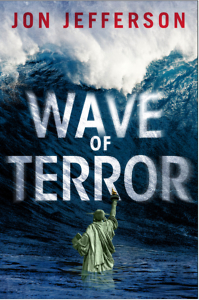Trading Mystery for Intrigue
Body Farm co-author Jon Jefferson raises the stakes with a new thriller, Wave of Terror
Jon Jefferson’s newest novel, Wave of Terror, explores a terrorist plot on a scale that would put 9/11 to shame. Jefferson is best known as half the mystery-writing team of Jefferson Bass, of The Body Farm fame, but this book is not about the discovery of a badly decomposing body and the resulting forensics investigation. Instead, Jefferson has crafted a compelling, action-packed spy thriller that’s part James Bond and part big-budget disaster movie. Body Farm novels are traditional whodunit mysteries. Wave of Terror is a thrilling race against the clock to prevent a catastrophe the likes of which the world has never seen.
 Events begin innocently enough as astronomer Megan O’Malley, a “rising star of the Johns Hopkins astronomy department,” takes advantage of a three-day sabbatical to use the Isaac Newton Telescope on Spain’s La Palma Island (part of the Canary Islands off the northwest coast of Africa) in her search for Planet Nine. She is eager to be the first to verify the existence of the still-theoretical planet and win naming rights to it, etching her mark in history and compensating for her own flaws: “She already saw her imperfections at high magnification,” Jefferson writes, “unceasingly and unrelentingly.” Finding the planet would go a long way toward easing self-doubts.
Events begin innocently enough as astronomer Megan O’Malley, a “rising star of the Johns Hopkins astronomy department,” takes advantage of a three-day sabbatical to use the Isaac Newton Telescope on Spain’s La Palma Island (part of the Canary Islands off the northwest coast of Africa) in her search for Planet Nine. She is eager to be the first to verify the existence of the still-theoretical planet and win naming rights to it, etching her mark in history and compensating for her own flaws: “She already saw her imperfections at high magnification,” Jefferson writes, “unceasingly and unrelentingly.” Finding the planet would go a long way toward easing self-doubts.
Things don’t go as planned. Each time O’Malley aligns the telescope to conduct her search of the heavens, it inexplicably shifts, ruining her night of stargazing. Tiny earth tremors are to blame for knocking the telescope’s delicate sensors out of alignment, it turns out, but the cause of the tremors is a mystery, and the Global Seismographic Network (GSN), which monitors such things, has no record that they have occurred: “If the small squiggles she was looking at had actually been sound waves, they’d have been whispers, she concluded—and if they’d been EKGs from a hospital patient, the patient would be in serious need of speedy CPR or perhaps leisurely transport to the morgue.”
 O’Malley’s dogged investigations ultimately reveal a doomsday scenario—deliberate explosions along a major fault line through La Palma that could result in a major earthquake, causing a massive tsunami that would bury half the United States, as well as Europe, under a sea of water.
O’Malley’s dogged investigations ultimately reveal a doomsday scenario—deliberate explosions along a major fault line through La Palma that could result in a major earthquake, causing a massive tsunami that would bury half the United States, as well as Europe, under a sea of water.
Meanwhile, half a world away in Washington, D.C., FBI Special Agent Chip Dawtry, who lost his brother in 9/11, “auditions” for an important position as FBI liaison to the CIA. The interview doesn’t go well, and Dawtry is basically shown the door. In a contrived but forgivable twist that propels the plot forward at a breakneck pace, Dawtry is handed O’Malley’s report with its wild theory about the terrorist risk, and he rushes to La Palma to investigate. Hoping to prevent the unthinkable from happening, the two protagonists race to determine who has been blasting on La Palma even as the culprits behind the plot close in on them.
Dawtry and O’Malley are a likable, fun pair with a clear passion for justice. Both are coolly intellectual, strong-willed, and willing to break the rules to get what they want. The novel is packed with page-turning action and huge stakes, but it also offers plenty of humor and even a hint of romance. As in the Body Farm novels, Jefferson introduces complex scientific detail and theories while keeping the novel accessible to readers—and the plot moving.
G. Robert Frazier is a former Middle Tennessee newspaper reporter and editor now working as a book reviewer and aspiring screenwriter. He has served as a script reader for screenwriting competitions at both the Austin Film Festival and the Nashville Film Festival. He lives in La Vergne.


